Napoleon's Game of Thrones with His Kin
Part "Game of Thrones," part "Succession," with a dash of "The Beverly Hillbillies" thrown in, the Bonaparte clan helped power Napoleon's rise.
The story goes that it was Paola, the sixth-youngest of the Buonaparte children — the one later known as the most beautiful sexpot in Europe — who found the money. Thousands of gold coins stuffed into the mattress of their freshly-deceased uncle, the archdeacon of the island of Corsica, who died mere inches above his life savings.
The fortuitous find afforded a moment of relief for 41-year-old Corsican widow Letizia Buonaparte, a minor noble, trying to support her eight children — who ranged in age from 7 to 23 — on the income from their small vineyard off the coast of Italy. But the tranquility didn’t last long.
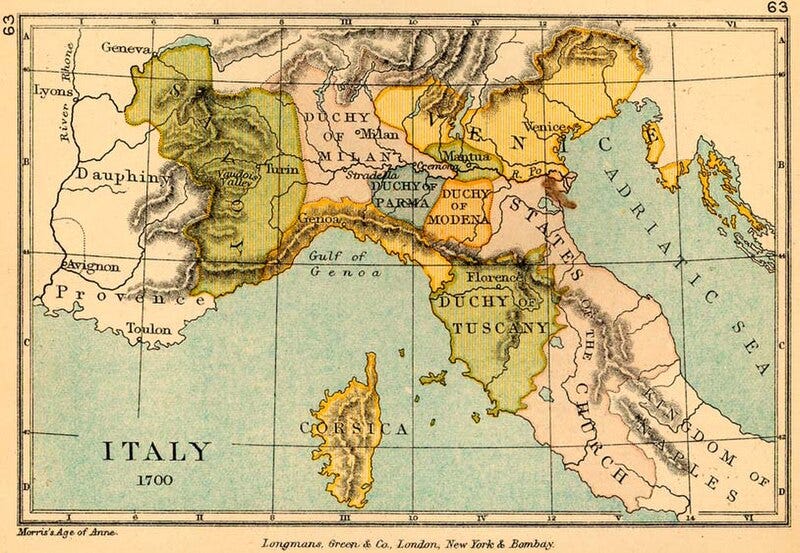
Headstrong Lucciano, her third son, soon thereafter got the clan run off the island — after the 17-year-old denounced Corsica’s powerful president, a nationalist, calling him a tyrant and getting him fired.
The nationalist leader sent out his posse to haul in the whole family, dead or alive, forcing the clan to hastily flee to France, where the second-oldest Buonaparte — Napoleone — was making a name for himself as an artillery captain. By the time the posse torched their Corsican home, the Buonapartes were making their way towards a boat to cross the Mediterranean to join him.
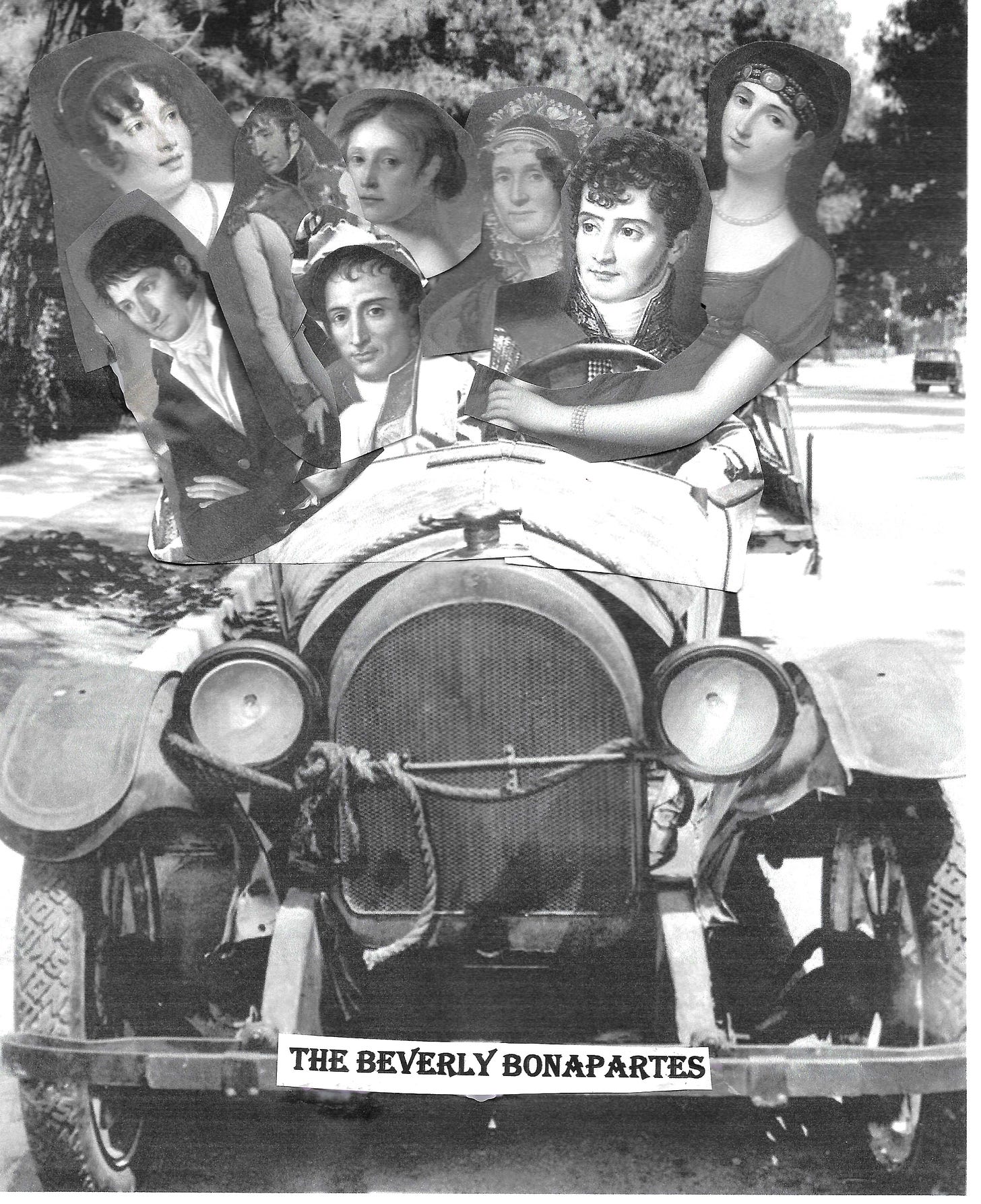
Once they arrived in the south of France, Napoleon — who’d dropped the “e” on his name — insisted on new names for them all: starting with Guiseppe, who became Joseph, and Lucciano, who became Lucien, the names of all his siblings were likewise Frenchified, as was their surname.
Becoming French
The clan had scarcely settled into Marseille when two significant things happened. Joseph met and quickly married Julie Clary, the daughter of a wealthy silk merchant, whose dowry helped support the family, which was running out of the gold coins. (Napoleon was engaged to her younger sister, Desiree, a relationship that later had a sharp twist as noted below.)
More importantly, Napoleon became a general, scoring impressive victory after victory, and within just a few years becoming the most powerful person in France, and then Europe.
Napoleon did not rise alone: he yanked his family right along with him — although his siblings often thwarted his plans and occasionally stabbed him in the back.
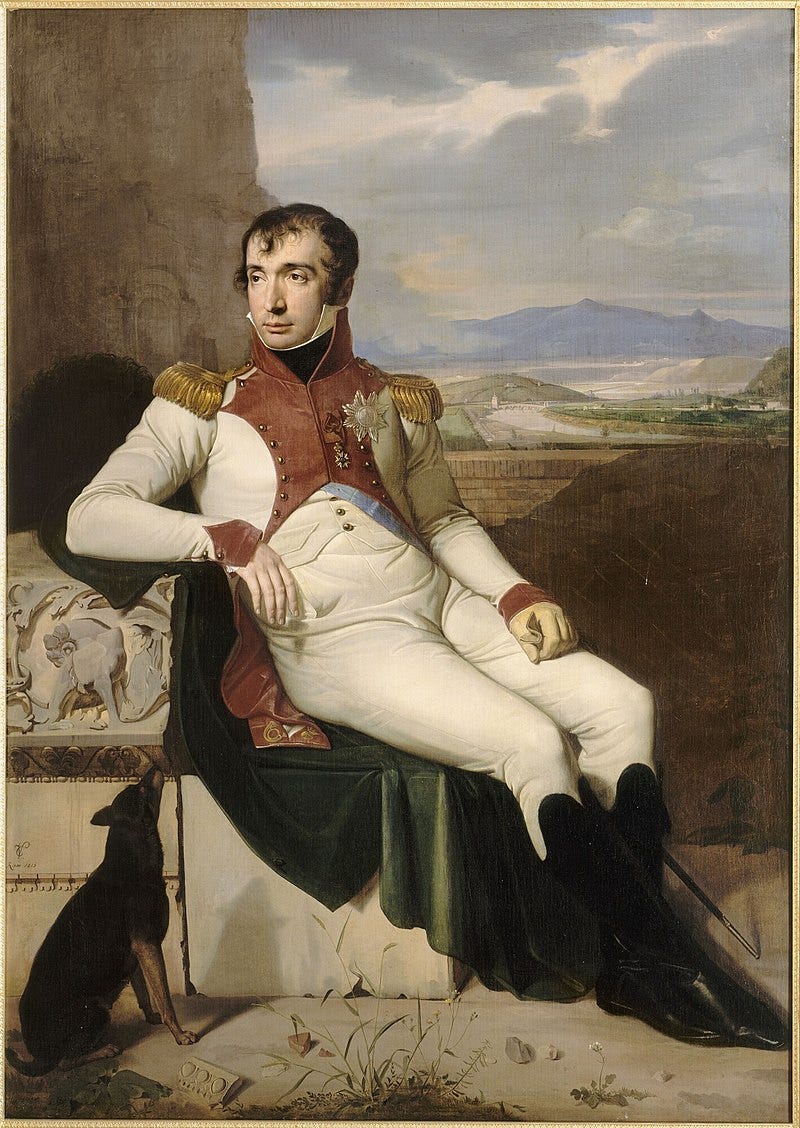
Sibling Rivalries
Napoleon’s brother Louis often accompanied him in battle — but Lucien, president of the lower house of parliament, played the most important role in Napoleon’s ascent. In November 1799, Napoleon, alongside his soldiers, dramatically charged into the palace where parliamentarians were meeting — planning to toss the faltering French Revolutionary government.
However, the attempted coup d’etat met resistance, Napoleon gave a befuddled speech, and the overthrow looked unlikely to succeed — until Lucien brandished a sword, swearing “to plant a blade in the breast of my own brother if he ever violates the liberty of the French!” That moving oratory brought Napoleon to power — and Lucien never let him forget it.
Napoleon formed a three-man ruling government — with Napoleon dominating everything — appointing Lucien as his Minister of the Interior. Napoleon tapped Joseph as his lead diplomat — sending him off to make peace with France’s fiercest foe, Britain.
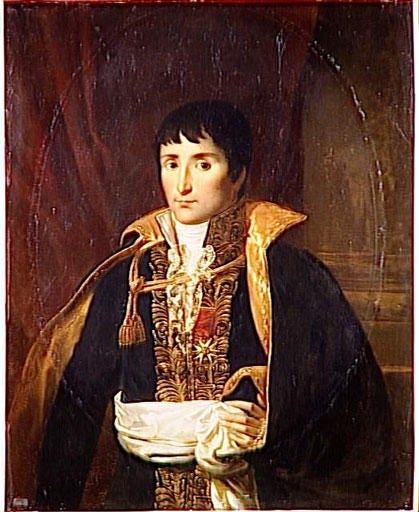
The peace treaty Joseph negotiated with Britain lasted a mere 14 months and Lucien didn’t make it that long. He infuriated his brother by publishing a pamphlet likening Napoleon to Oliver Cromwell and Caeser — and was forced to resign. When their mother intervened, as was her wont, Napoleon sent Lucien as his ambassador to Spain, where Lucien negotiated important treaties and grew wealthy from bribes.
Fraternal Discord: Returned to Paris in 1803, Lucien along with Joseph stormed into Napoleon’s palace upon learning of his plan to sell the Louisiana Territory to the U.S. They found him soaking in his bathtub — and informed him they would block his plans to sell. Outraged, Napoleon sat up and yelled that his brothers were “insolent.” Then he purposely threw himself back in his bath, entirely soaking them. Of course, he totally ignored their protests, going through with the Louisiana Purchase that doubled the size of the United States.
Lucien further enraged Napoleon by dismissing him whenever he tried to control the family’s love affairs and marriages, which was often. When Napoleon chastised him for living with a woman of loose morals, Lucien sniped, “At least my whore is pretty!” — a dig at Napoleon’s wife Josephine, whom the clan detested and frequently plotted against.
In late 1803, both Lucien and his youngest brother, Jerome — whose outrageous antics are explored in a separate post — ignored Napoleon’s wedding plans for them and married women of their own choosing. The next year, when Napoleon crowned himself emperor, he crossed them both right off his Soon-to-Be-Monarchs List.
The Games of Thrones Begins in Earnest
As emperor, Napoleon expanded the empire across Western Europe — making kings and queens of his kin to ensure that his edicts were enforced.
He made his sister Elisa ruler of the Italian principality Piombino and Lucca in 1805. The next year, he made Louis the king of Holland and Joseph the king of Naples.
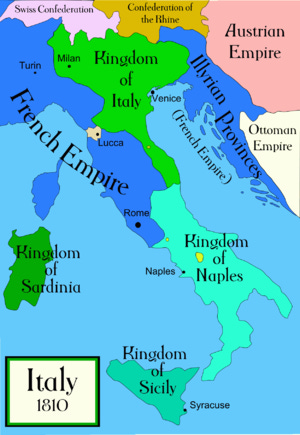
In 1807, as demanded by Napoleon, Jerome annulled his first marriage and instead wed an Austrian princess, and was rewarded by being crowned King of Westphalia, a German territory. In 1808, Napoleon changed Joseph’s title — making him the king of Spain and filling the vacated throne in Naples with King Joachim Murat and Queen Caroline Bonaparte Murat, in part to stop the constant complaining from the latter.
HOW THEY RATED AS RULERS:
Frankly, they were all pretty selfish, but some of the sibs were better suited to rule than others.
Elisa Bonaparte: The only sister to whom Napoleon afforded actual power, Elisa, Princess of Lucca and Piombino (1805-1814) and Grand Duchess of Tuscany (1809-1814), started schools for girls, set up free hospitals for the poor, founded banks for workers and colleges for artists, as well as patronizing painters and funding scientific endeavors. She also improved roads and mostly ignored Napoleon’s calls for conscripts.
Joseph Bonaparte: During his brief reign as King of Naples (1806-1808), Joseph modernized, employed the poor with his major road-building projects, and personally visited village after village gaining wide popularity. As King of Spain (1808-1813), however, he was loathed, his presence kicking off the Peninsular War and frequent guerrilla attacks. Widely portrayed as a drunk, he was also hated by conservatives for ending the Inquisition. It wasn’t Joseph’s fault he was so unpopular: Napoleon was holding the Spanish royal family in France and sent in his brother as their unwanted Bonaparte replacement.
Louis Bonaparte: As King of Holland (1806-1810), Louis took both his new job and new country seriously. He famously gave a speech showing his mastery of the Dutch language, proclaiming “I am the rabbit of Holland,” confusing the words for rabbit and ruler. Nevertheless, some called him “Louis the Good” for visiting sites of tragedies, attempting reforms, and defying Napoleon’s dictates, including the boycott of British goods. Which is why he was soon fired as king.
Jerome Bonaparte: As King of Westphalia (1808-1813), a German territory, Jerome banned serfdom and spent massive sums improving buildings, particularly his royal palaces. Appointing his pals as ministers and always ordering the finest kingly threads, he quickly sucked his kingdom financially dry.
Caroline Bonaparte: Caroline, as Queen of Naples, (sorta) co-ruled with her husband, King Joachim Murat (1808-1815), but did little but refurbish and refurnish royal residences and put in vast gardens. She did manage to start a girls’ school in between buying jewelry and posing for paintings. She also convinced her hubby to betray Napoleon.
Pauline Bonaparte: Napoleon made her duchess of the Italian territory Guastalla. She promptly sold it to a neighboring prince, making a few million out of the deal.
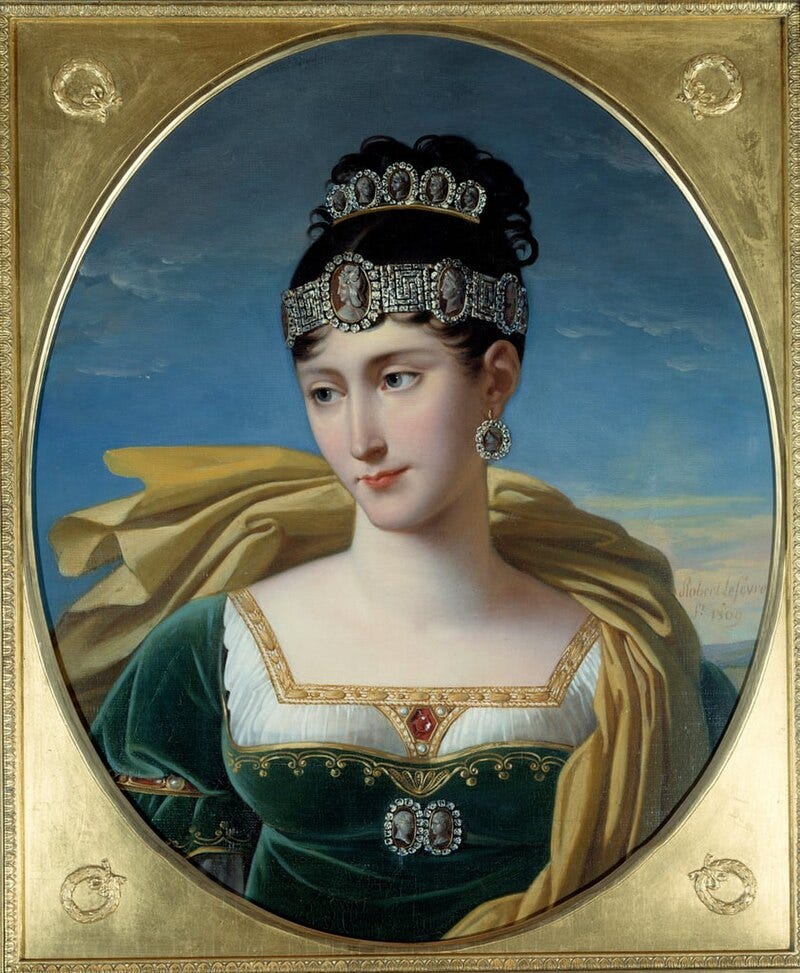
Lucien, who ignored Napoleon’s demands to annul his marriage and wed a Spanish princess, was the big loser in the Bonaparte Game of Thrones — so he took up art collecting, archeology, and matters literary, writing his memoirs and penning an epic poem about Charlemagne.
Louis later wrote a book too — about the history of Holland and how Napoleon had screwed it. He had lots of time for writing after Napoleon ejected him from his throne in 1810.
Succession Squabbles
Beyond the opportunity that it gave the Bonaparte family, which Napoleon had named a dynasty, to trash Empress Josephine, the absence of a son for Napoleon made for frequent elbowing about the line of succession: Joseph had produced only daughters, Lucien’s offspring were disqualified from the line up because Napoleon was mad at their dad, Louis didn’t think his sons were genetically his, and the ideal heir was a boy, not one of Napoleon’s brothers.
Pauline, whose son Dermide was the oldest boy of all the nieces and nephews, wanted him at the front of the line — and Caroline wanted her son, Achille, born two years after Dermide to follow, all the more after Dermide died in 1804. Both were chagrined that their boys stood behind the males with the last name Bonaparte.
Even though any son by Napoleon would knock all the males down a notch, the family so much wanted Josephine out of the picture that Caroline matched her brother up with one of her ladies-in-waiting, Eléonore Denuelle de La Plaigne, who became pregnant in 1806.
While Napoleon accepted the boy as his illegitimate son, he didn’t leave Josephine who’d always insisted that it was Napoleon who was the infertile one. Perhaps Napoleon wasn’t entirely sure if Eléonore’s boy was actually his sire — since Denuelle was also said to be sleeping with Caroline’s husband, Joachim Murat.
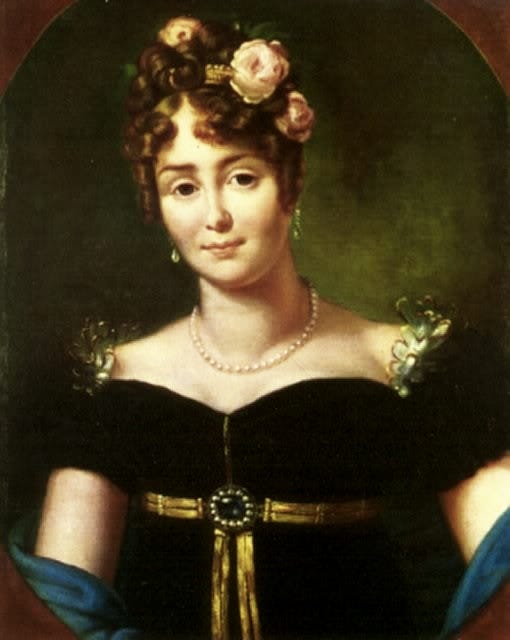
However, in 1809, when Napoleon’s Polish lover, Countess Marie Walewska, became pregnant the proof appeared irrefutable. Shortly thereafter, Napoleon annulled his marriage with Josephine, and the next year wed Austrian archduchess Marie-Louise, who bore him a son within a year.
Napoleon always regarded Joséphine as his good luck charm. Even though he soon had a son after leaving her, his world quickly came crumbling down, particularly after his 1812 invasion of Russia, his most stupid move.
Betrayals
Even if he held more disdain for Lucien, his sister Caroline proved the most devious of the bunch. In 1814, when the tides were turning against Napoleon, she convinced her husband Joachim Murat, King of Naples, to join the Coalition of Austria, Russia, Prussia, and Sweden in fighting Napoleon — hoping that they could thus continue their reign as Naples’ rulers.
In those final battles, Napoleon was doubly screwed — also fighting against Jean-Baptiste Bernadotte, formerly one of his finest marshals, who’d married Napoleon’s first fiancée, Desiree Clary, and was now leading Sweden’s fight against the Frenchman.
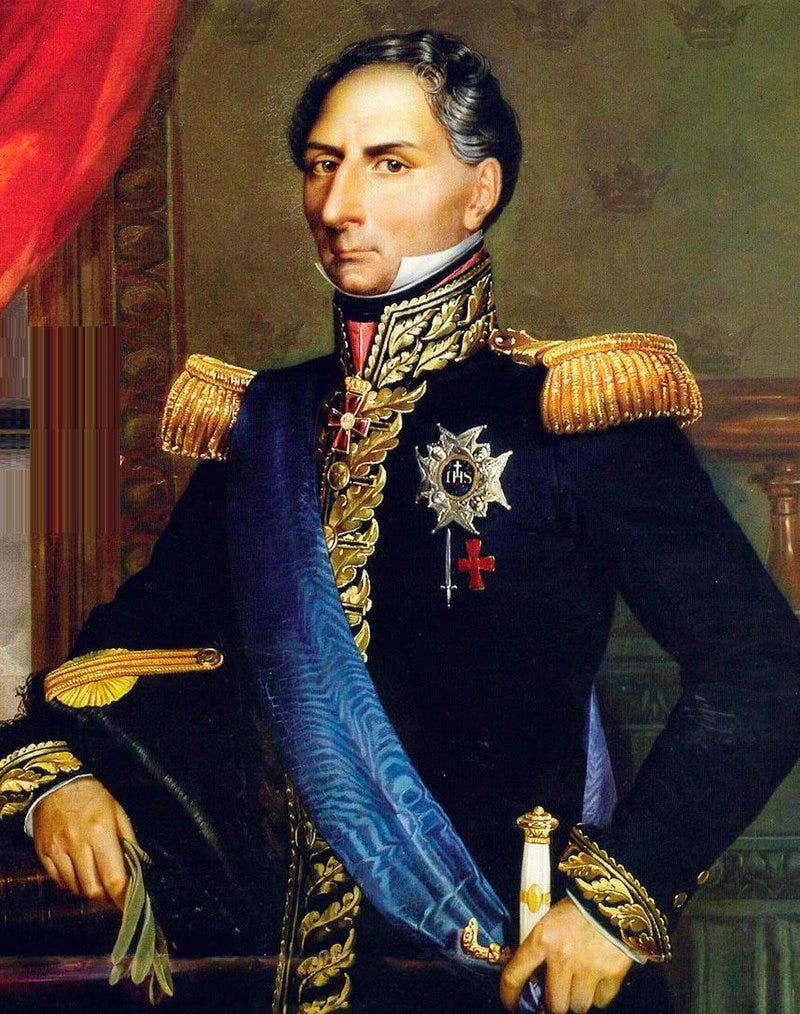
Where Loyalties Lie
When the Allies took Paris and Napoleon, forced to abdicate, was shipped off to Elba in 1814, the only members of his family to travel to the island off of Italy were his mother and Pauline, who moved there during his 11-month exile, bringing Napoleon lots of money. Josephine wasn’t permitted to travel there, nor were Marie-Louise and her son with the former emperor. Walewska and her son were among Napoleon’s visitors at Elba.
However, when Napoleon escaped and returned to France to rule for 100 days, all of his brothers — including Lucien — showed up to fight with him, except for Louis, who’d grown even more bitter, and who claimed that ill health prevented his appearance. Even Murat tried to see him, but Napoleon shunned him.
After the Battle of Waterloo in 1815, Napoleon was again forced to abdicate and shipped off to St. Helena, where he died six years later. Joseph fled to the United States, where he set up in New Jersey. Murat tried to retake his throne in Naples, but the original king of Naples returned from exile in Sicily, and rounded him up, trying him for treason. Murat was shot by firing squad.
Most of the fallen dynasty relocated to Rome and Florence, most dying relatively young, several from stomach cancer, the same affliction that killed Napoleon.
Although there was occasional talk of trying to reestablish Bonaparte rule, not one of his siblings lifted a finger or even slightly encouraged their nephew Louis-Napoleon — the quixotic son of Louis — who was convinced that he would one day rule as Emperor of the French.
By the time Louis-Napoleon made good on his word, in 1852, all of Napoleon’s siblings were dead, except Jerome — who’d been the one who’d most loudly badmouthed Louis-Napoleon and his silly dreams.
Jerome being Jerome, he was happy to accept the new titles, palatial digs, and bags of money bestowed upon him by Louis-Napoleon, who became Emperor Napoleon III, the true successor to Napoleon’s Game of Thrones and who launched the magnificent Second French Empire, the subject of an upcoming post.




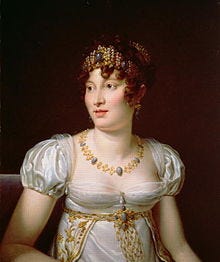
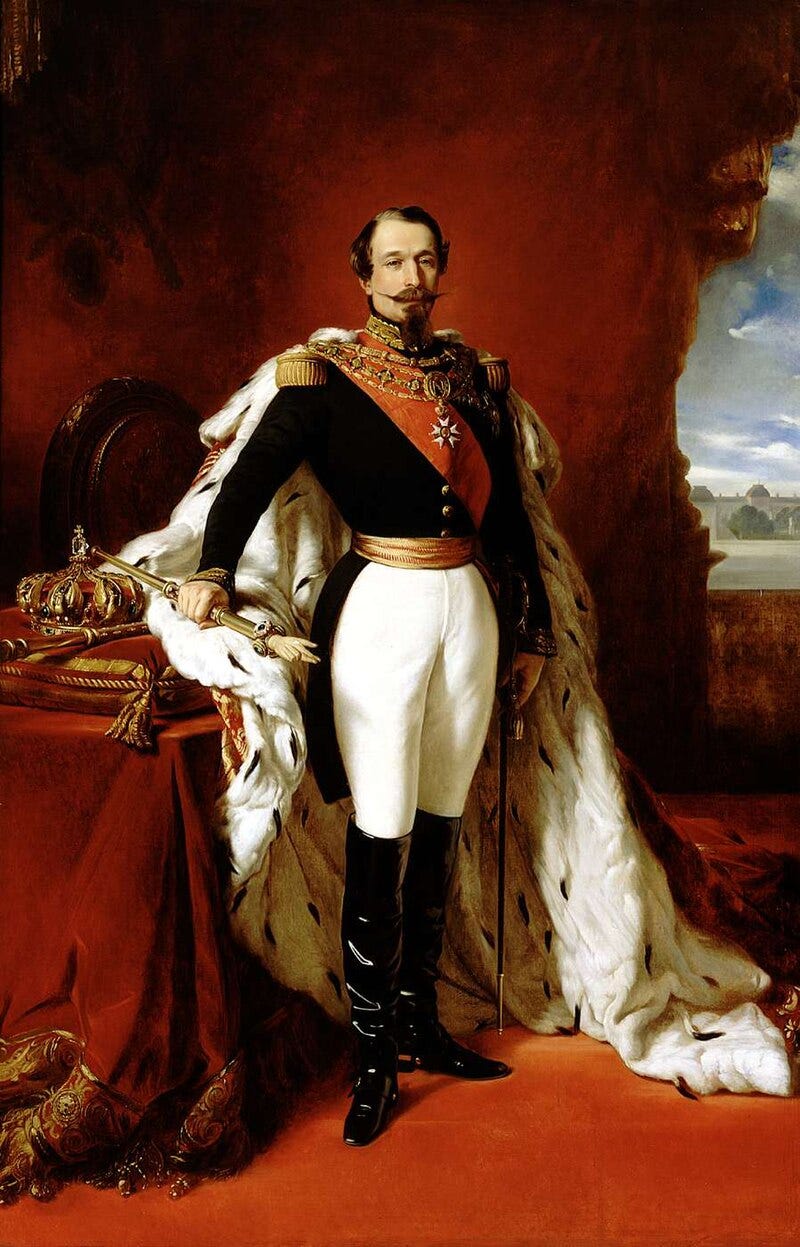
Seems like a fairly complex series of arrangements to try and keep in power.
Nicely done! Getting ready the popcorn for this new vision of an epic character. And with your lovely touch, I can understand better those Corsican adventurers and their capo weakness for grandeur.